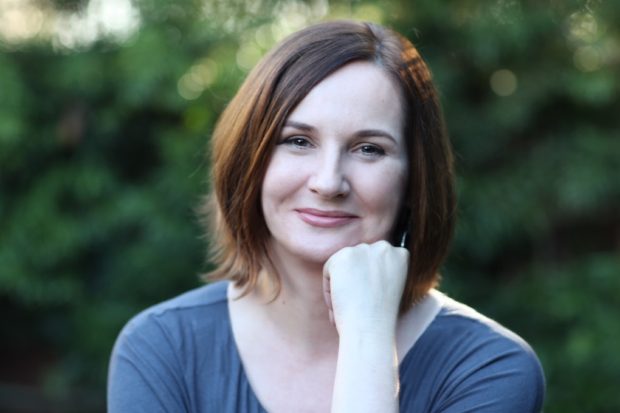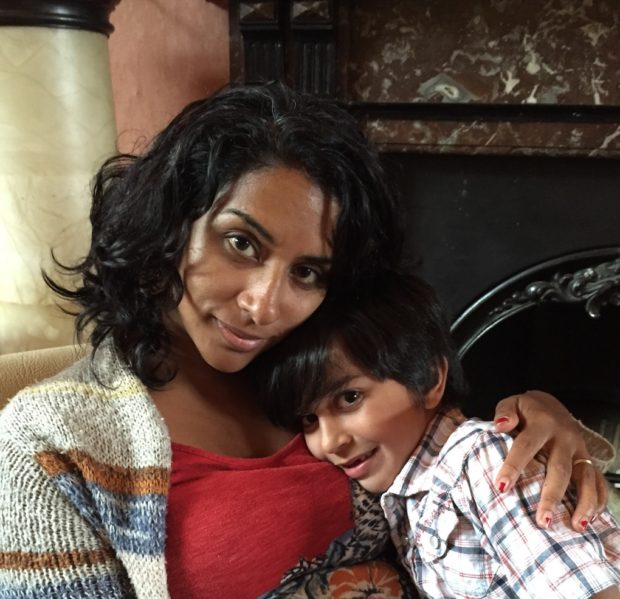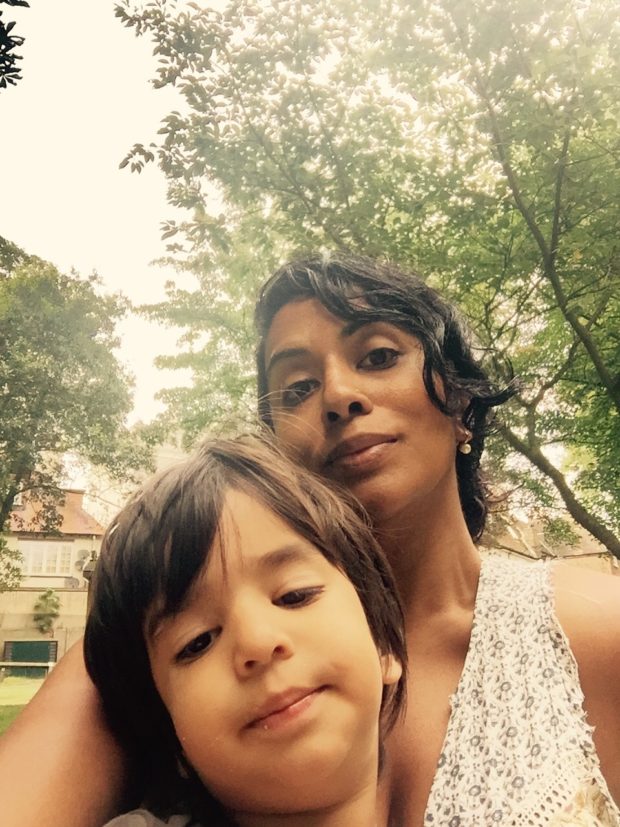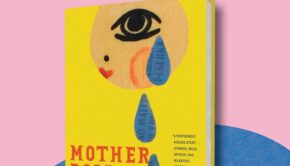Imposter Syndrome, Self-Sabotage and Redefining Parenting—Edan Lepucki, Ethel Rohan and Shanthi Sekaran in Conversation
The San Francisco Bay Area is a unique and beautiful place to be a writer and a parent. Yes, the traffic. Yes, the tech bubble. Yes, the gentrification, high rent and lack of housing. Yes, the poorly driven Priuses. But then there’s the arts, and in particular, the literary scene–expansive, diverse and still, somehow, intimate. Here, three bay area authors with recent novels talk imposter syndrome, redefined parenting and self-sabotage. Ethel Rohan’s The Weight of Him (St. Martin’s Press, February 2017) tells the story of Billy Brennan, a 400-pound Irish father who deals with the death of his son by trying to save others, and himself. Edan Lepucki’s Woman No. 17 (Hogarth, May 2017) is a Los Angeles-based noir tale about motherhood, art, ambition and regret, told through the eyes of Lady, an aspiring author and mother to a non-verbal teenage son. Shanthi Sekaran’s Lucky Boy (Putnam, January 2017) explores the topics of undocumented immigration, privilege and motherhood through the eyes of two women, Soli and Kavya, whose lives collide over the fate of a young boy.

Shanthi Sekaran
Shanthi: Our three novels are very different, yet there are common threads in how our characters take risks in the face of doubt and impossibility, and how parents try to get back, in various ways, to their children.
Ethel: I was really struck by those common themes, too.
I didn’t set out to write a novel about a parent trying to get back to a child, or vice versa, but subconsciously it totally plays into my preoccupations and obsessions as a writer around saving loved ones/saving relationships and trying to get back to a time when those relationships/love were intact.
Shanthi: Ethel, do you think Billy’s plan for the march to honor Michael and his life is in some way an attempt to get back to his son? Symbolically, at least?
Ethel: Absolutely. At that point he’s still delusional in his grief. Some part of his sub-conscious believes he can get back to Michael, and save him.
I also appreciate how all of our novels push back against the impossibly narrow definition of what it means to be a (good/fit) parent.
Edan: We’re changing the conversation about parenting, one book at a time!

Ethel Rohan
Shanthi: Yes—there’s a lot of questioning in all three books about whether our characters fit the mold of the “good” parent.
Ethel: Right. What is a good parent? Parenting, like the body, and the female body in particular, is politicized and policed—
Edan: This is true, but I wonder if, in our daily lives, we experience the pressures of parenting in this larger, political way. I don’t. That’s not to say it isn’t there—it is, for sure!—but that our expectations and the narratives we receive feel very personal and private. And I wanted to get at that in Woman No. 17.
Shanthi: That idea of the good parent makes me think of the initial inspiration for Lucky Boy. I’d heard the story of a Guatemalan mother fighting for custody of her son when she was put in detention. The court rulings repeatedly ruled in favor of the couple trying to adopt her little boy, saying that his Guatemalan mother had an “unfit lifestyle.” Meaning that she was in the country without papers. That made her a bad parent, supposedly. Never mind that she was working and doing everything she could to raise her son.
Edan: Shanthi, that story breaks my heart. Especially these days, with families getting ripped apart under Trump’s immigration policies. Do you think a relationship between parent and child is ever, truly, intact? Or is there a myth that feeds into a sense that we aren’t doing things right, as parents, as children?

Edan Lepucki
Shanthi: That’s a good question. I don’t think parents and children are ever completely bonded. How could we be? Humans are too much trouble for that. And yet we build these myths—that a mother’s love will always be a comfort to her baby, for example. How about a baby that won’t stop crying?
Ethel: I wonder if it’s even more than myth? Do we thwart love? Self-sabotage? I can’t help feeling that with so many of our novels’ characters some core part of them is closed to love and expected/prescribed bonds?
Edan: As a writer, I’m obsessed with the idea that we are prone to self-destruction, that we desire intimacy—and push it away—at the same time.
Ethel: Yes, Edan. And I really felt that with Lady in particular.
Shanthi: Edan—I was so intrigued by the fact that Lady pushes her younger son, Devin’s, father away. When the book begins, they’re separated, and I spent much of the book wondering why she’d ordered her ex to leave when he seemed like a good guy. She seems to even push Devin away, as she focuses wholly on her older son, Seth.
Edan: Yes, Lady is a tough one—I feel for her so much, and feel protective of her, despite the fact (or, because) she inflicts such damage on herself and others. She loves her oldest son, Seth, so much and yet she cannot take a step back to see how her actions affect him. One of her problems, and I think we see this with Billy and Kavya, too, is that she sees this as her story, not anyone else’s—so everything is happening to her.
Shanthi: I like to tell my students that every character in a book thinks that they’re the main character.
Ethel: Yes, we are all the central character in our own story.
Edan: I tell my students that too! That you better make the UPS guy, even if he’s got one line, have his own rich life, etc. And to what you just said, Shanthi, yes, why does Lady kick Karl out? I wanted Karl to be likable, to be the right guy for her—and for the reader to see that. I’ve been startled by the few readers who take Lady’s side and don’t like him. I really see this being a crisis point in Lady’s life: a moment when she has to come face-to-face with the fact that she doesn’t know herself, and that her narrative about accepting Seth is a lie. I also think she’s suffering from imposter syndrome: going from a single mom to this rich married lady. I think she won’t let herself be happy, and she won’t let herself enjoy Devin.
Shanthi: That imposter syndrome idea is interesting.
Ethel: “She doesn’t know herself.” Our true selves that we keep pushing away, and the truth about others that we push away also. Yes.
Shanthi: Do you think imposter syndrome is part of parenting itself? Do many of us feel like we’re imposters? Asking for a friend.
Ethel: Imposter syndrome and the stories we tell ourselves, right? The what we believe about ourselves and others that is fulfilled because we acted and lived accordingly (and our belief system is all too often catastrophic thinking).
Edan: YES! I often have this feeling, while I’m mothering, that I am “playing” the role of mother, especially to my young daughter: she gets these little songs, my “It’s time for bed!” voice, etc. My son, by now, knows me for me: my obsession with writing, my bad temper, my cussing. My daughter still thinks I’m mother numero uno. I don’t want to burst that bubble just yet.
Shanthi: I felt like an imposter too! I distinctly remember pushing a newborn baby across a park in London and feeling like I was in a play. I think we all feel a little out of our depth when we’re parenting? It’s like being a writer—with every new project, we become novices again. With every new stage of a child’s life, every new child, we have to wonder at times what we’re doing.

Ethel: I adore my two daughters but I in no way fit the role-mother model. I HATED every moment of the playground and that’s just one outtake from the early years.
Shanthi: I find that uplifting in a strange way.
Edan: I think this is, honestly, how many parents feel but don’t feel comfortable saying it. And it’s only recently that we’ve begun to see so many diverse stories about parenting. The father of someone who killed himself. The undocumented mother, and the foster parent—
Shanthi: And the single-by-choice mother.
There’s also the play-acting mothers seem to do for each other. Like at mom’s night out at our pre-school. All we talk about is our kids. I KNOW we all have fuller, dramatic lives (okay maybe not all of us), but most of us have non-kid stuff to talk about, things that could really benefit from the insight of other women, but instead we talk about naptimes.
Edan: Ethel, you are a woman and a mom, and a daughter. Why did you write about a dad? Can you talk about that choice, and how that perhaps changed the way you wrote about parenting?

Shanthi: Yes, Ethel. Did it free you up at all to write a father character? I feel like if I were writing about suicide from a mother’s point of view, I’d get so weighted down by my personal connection to motherhood that I wouldn’t be able to write. What made you choose a father’s perspective?
Ethel: My protagonist was male from the outset, even though the original spark was a snatch of conversation I overheard about a woman. I didn’t want the novel to be about my mother (so much of my writing is). Or, as you say Shanthi, about my own perspective on motherhood. I also didn’t want the novel to be about my own struggle with body shame and eating disorders. I wanted to break free from all that.
A father’s perspective did free me up to write out of my imagination and into knowingness and even though writing a 400lb male protagonist brought its own set of obvious challenges it was, I believe, the right choice for the story. Lastly, I was mindful that the female body is already horribly politicized.
Edan: For all three novels, there are also children being seen and interpreted in specific ways, depending on the parent.
Shanthi: Edan, I’m curious about Seth and the fact that he doesn’t speak. Did you know this about him from the very beginning of your writing? And did his lack of spoken language affect your experience of writing this book, or did the fact that he could write stuff down sort of make up for the lack of spoken dialogue?
Edan: The initial inspiration for the novel was that, when my first child, my son, was 15 or so months old, he didn’t yet talk. That’s pretty normal, but at the time, I was paranoid he would never speak. I began to wonder, What would that be like? What would our relationship be like?
So, Seth never spoke and that was central to the novel. But it was also the hardest part of the book—it’s not easy to write one-sided dialogue! And I also wanted Seth to be a well-rounded character, who was more than his disability. I wanted his experiences to be informed by his lack of speech, but he is so much more than that. It wasn’t easy.
Ethel: You did a great job with Seth, Edan. He’s compelling and has wonderful page presence.
Edan: Thank you. He’s one of my favorite characters.
Shanthi: Well-rounded characters. I think our novels presented particular challenges with that issue: of telling a story of someone informed by their particular circumstances, but not defined by them. With Billy, for example. He’s not defined by Michael’s suicide, but it’s taken over his every waking moment. In a way, Michael becomes defined by his own suicide. I notice that people refer to the suicide simply as “Michael.” “After Michael” becomes short-hand for “after Michael’s suicide.” So in a way, at this stage in their grieving, Michael is his own death.
Edan: Such an astute point, Shanthi!
Ethel: Yes, great point, Shanthi. And that’s something I feel very strongly about. We are complex. Layered. No one thing defines us.
Ethel: Silence. In The Weight of Him it’s killing (figuratively and literally) but Woman No. 17 made me think of silence (Seth) as a form of withholding and resistance.
Edan: For The Weight of Him, Billy remembers Michael in this particular way, and can’t fit suicide or his son’s silence regarding his struggles into that narrative; in Lucky Boy, Soli and Kavya love the same child and there’s so much about that conflict that’s shrouded in silence and denial—he literally has two different names, two different lives, with each.
Ethel: Yes, such a small thing, his different name with each mother and yet so telling.
Edan: Denial, absolutely. Ethel, Billy also uses the cast-off toys to build a fantasy world—another way to get back to Michael, to place them both in a painless world. And Shanthi, I feel like Kavya wants to protect Iggy—she doesn’t want him to go back to his birth mother in part because she wants to give him the best imaginable life. Do you think she is acting selfishly?
Ethel: Yes, and Billy gets so much more out of his fantasy world than he does reality. And that’s so messy, too. Because in fantasy we can imagine no suffering, but also by choosing fantasy over reality we’re neglecting the latter and it’s of course not going to nurture reality and suffering persists.
Shanthi: Edan, yes, I think Kavya is being selfish about holding on to the person who has filled her life with all that she was missing. As a socially responsible person, as a former activist and Berkeleyite, she knows better. She knows deep down that Ignacio isn’t hers. But she comes to terms, in her own mind, with making a selfish decision when she wants to adopt him. I think the word “imagine” is a good one. Parents “imagine” the best possible worlds for their children, and sometimes those imaginings don’t completely mesh with reality.
Edan: We’ve all reached outside of our own experiences in our novels. These novels, and the novels I love, go beyond the surface and present that which is painful, complicated, vulnerable.
Ethel: Lauren Cerand recently said that I write about the things no one wants to talk about and I really liked that. I think that’s common to all three of our novels.
Edan: I’m curious how writing has changed our mothering, and how mothering has changed our writing?

Ethel: I think I’m an overall selfless parent. I’m very intentional in that I want to be every bit the mother to my daughters that my (mentally ill) mother could not be to me, but I’m deeply grateful to writing in that it gave me a rich and wonderful (and sometimes brutal) outlet and identity beyond motherhood. It also insisted on my showing up and my not giving myself over entirely to my children and for that I’m deeply grateful. The trope of the martyr mother is such bullshit.
Shanthi: I wonder if any of us could have written our respective books without having had our own children? I suspect that I couldn’t have portrayed either Michael’s or Lady’s experiences–the depth of grief, the unending worry and speculation of raising a non-verbal child–without having experienced motherhood. My first book, The Prayer Room, I wrote before I’d had children. And I gave my main character triplets. Without even thinking about what that could mean for a mother on a daily basis. I just didn’t get it.
On a more practical level, motherhood has made me want to write. With so many things demanding my time, writing has become something I get to do, not something I have to do. I can no longer complain about having to sit quietly by myself and letting my imagination roam.
Edan: I agree, writing is this incredible outlet that allows me to have an identity outside of motherhood. I think, though, because my kids are so young (5 and 1), I’m struggling with balancing it all. And, so close to the publication of my book, I feel very torn: wanting to be focused on my kids when I’m with my kids, but ultimately very distracted by career stuff. Thankfully, that’s not actually writing. That’s publishing.
Ethel: Oh I feel that, Edan. Balance is everything. And the time when our children are young is fleeting and precious (even though the former, at least, does not feel that way in the moment).
Edan: Yes, Shanthi, my experiences as a mother have informed my fiction, and made it richer, more nuanced. I think having the privilege to witness a person grow up, from that intense vantage point of a parent, is incredibly illuminating–it’s taught me so much about character!
And I totally feel that now: writing is such a thrill and pleasure! Something I must claim.

Shanthi: That’s a great point. We’re watching our own little characters. And forming them.
Ethel: Yes, so much about character, and about communication. I adore how refreshingly literal children are. They make me ever more mindful of how much we as adults manipulate language and control meaning—in ways glorious, and heinous.
Edan: Kids are so strange and terrific! (And they also make me crazy.)
Shanthi: Kids are the best little weirdos for a writer to be around.
Ethel: Ha! So true.
These books are available now—you know what to do, head to your local indie bookstore, stack three up, and get to reading. Please, continue the conversation in the comments!
Shanthi Sekaran’s novel Lucky Boy has been praised as “richly layered” and “superbly crafted”. Her first novel, The Prayer Room, came out in 2009 and her short fiction and essays have appeared in The New York Times, Mutha Magazine, Huffington Post and Best New American Voices. Sekaran now lives in Berkeley and is a member of the San Francisco Writers Grotto.
Ethel Rohan‘s debut novel, The Weight of Him, won the inaugural Plumeri Fellowship. She is the author of two story collections, Goodnight Nobody and Cut Through the Bone, the former longlisted for The Edge Hill Prize and the latter longlisted for The Story Prize. An award-winning short story writer, her work has appeared in The New York Times, World Literature Today, Tin House Online, GUERNICA Magazine, The Stinging Fly, and many others. Raised in Dublin, Ireland, she lives in San Francisco and received her MFA in fiction from Mills College, CA. She is a member of San Francisco Writers’ Grotto.
Edan Lepucki is the author of the newly released Woman No. 17, the novella If You’re Not Yet Like Me and the bestselling novel California. A graduate of the University of Iowa Writers’ Workshop, her fiction and nonfiction have been published in Narrative Magazine, The New York Times, and McSweeney’s, among others. The Los Angeles Times named her a Face to Watch for 2014. She is a contributing editor to The Millions and the founder of Writing Workshops Los Angeles.








